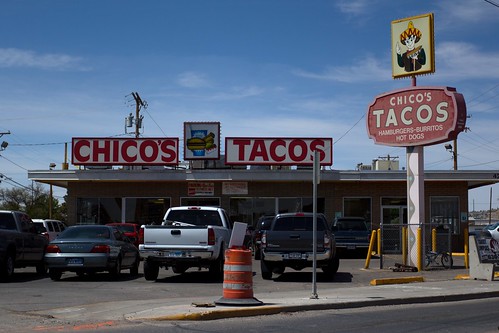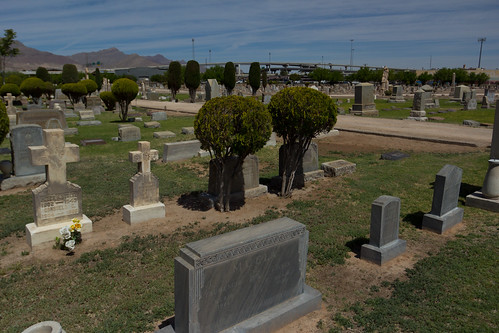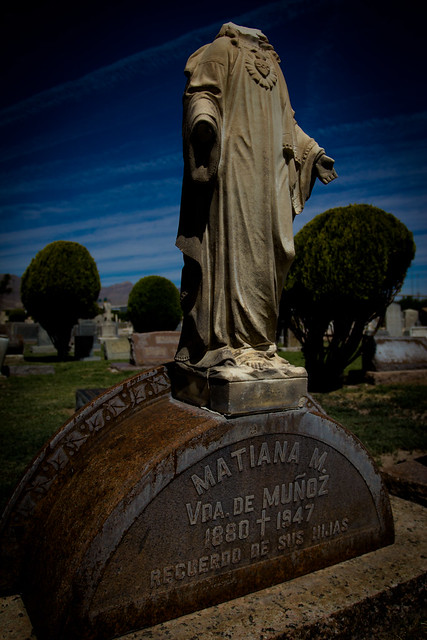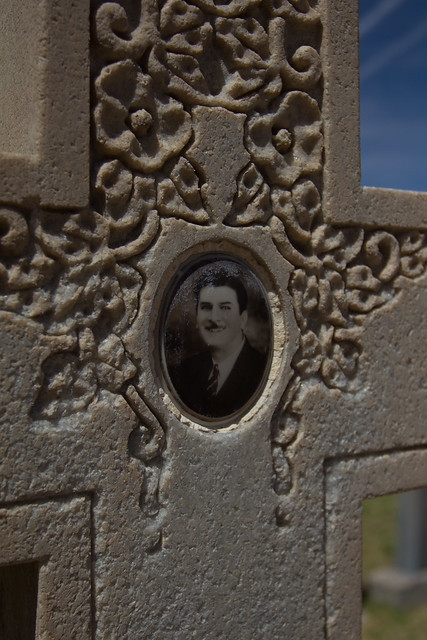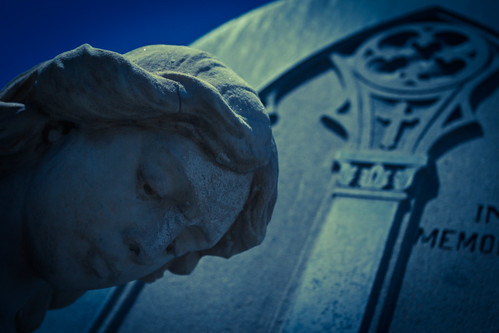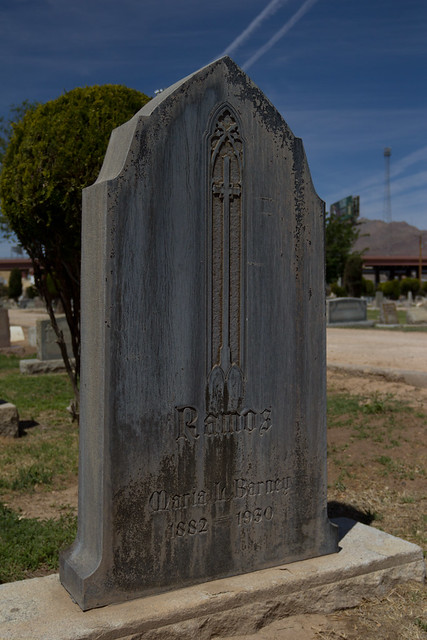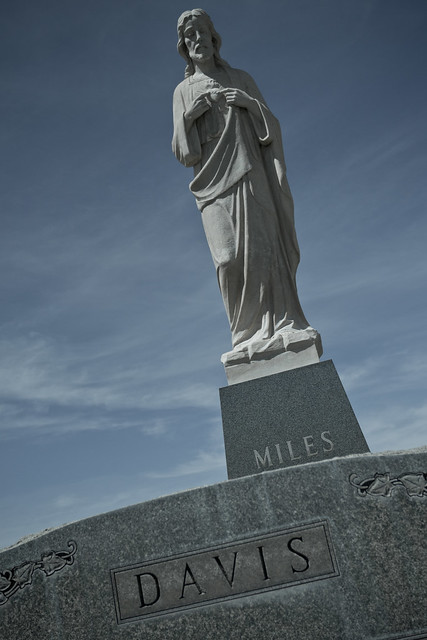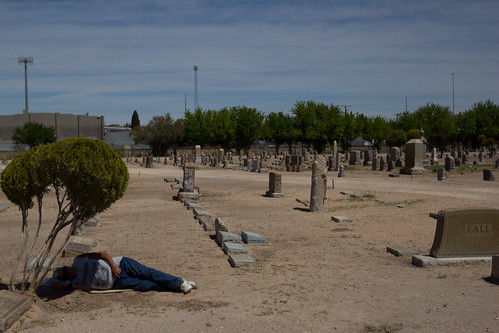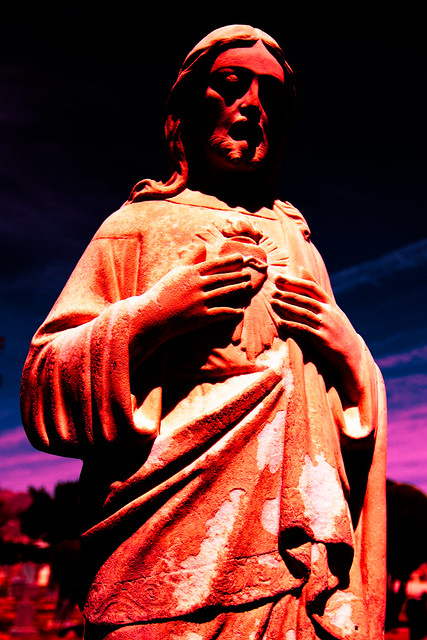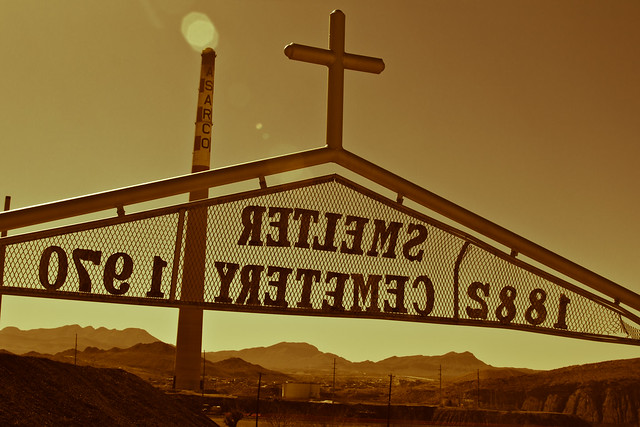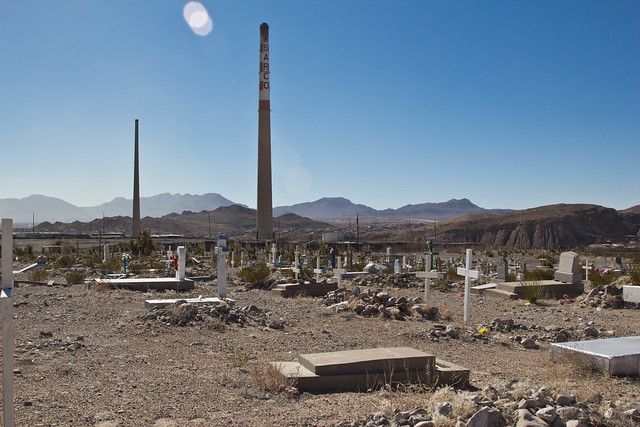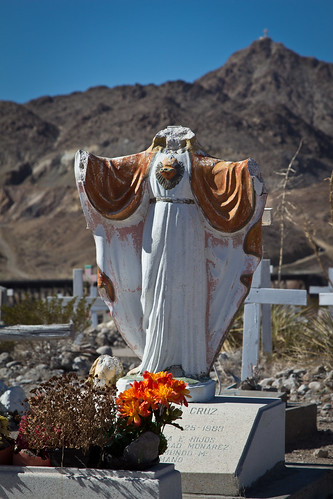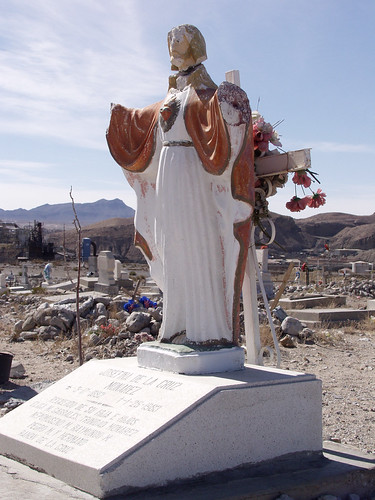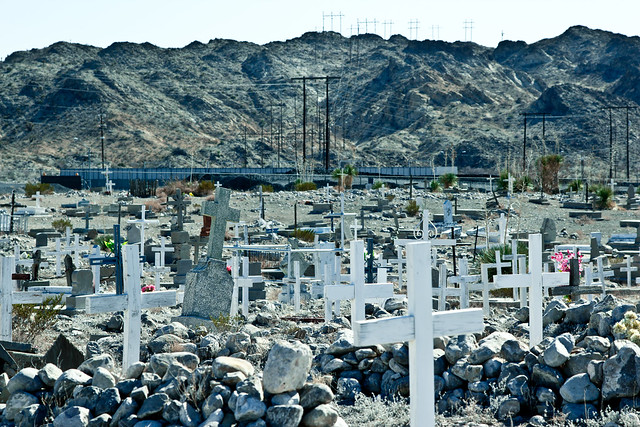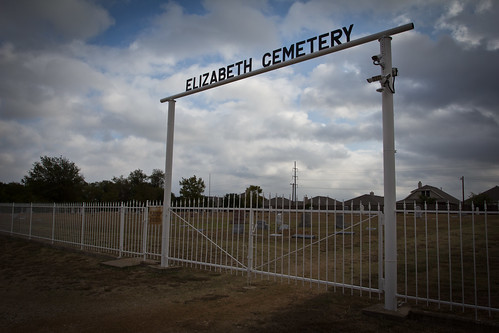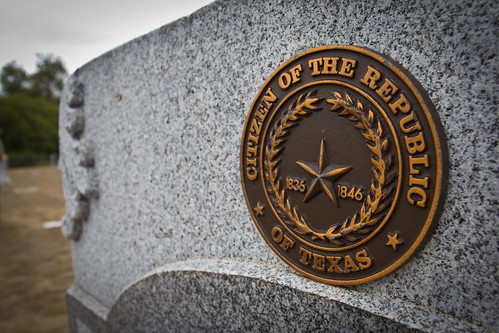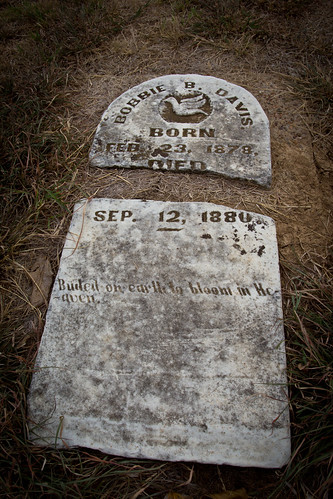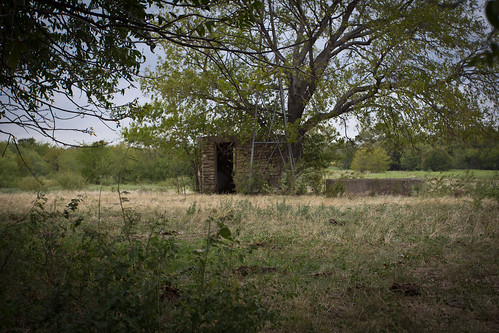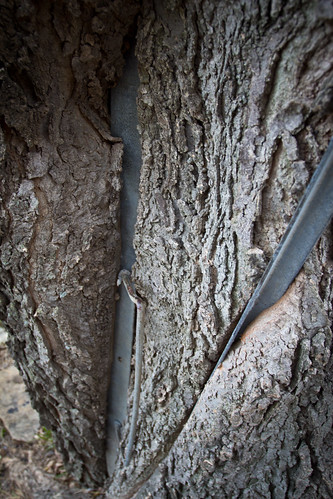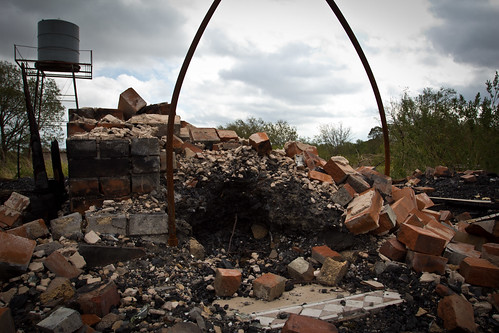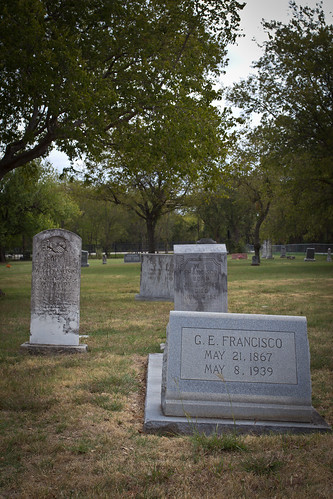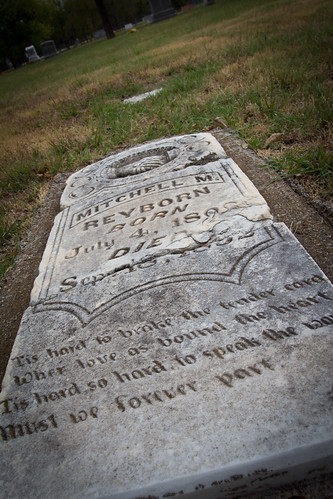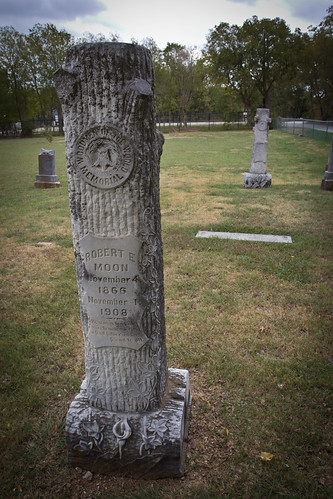Smelter Cemetery in HDR
I thought I would try my hand at capturing some HDR shots of the Smelter Cemetery on El Paso’s westside. This was a little different for me because I had to setup shots using a tripod. Normally I just shoot hand held. To create a shot in HDR, the software requires at least 3 shots to sandwich into 1 picture the total high dynamic range. These were the best ones:



Usually clouds vex me and are either blown out white or grey and nondescript. There are 16 shots in total and they really capture the range of whites to dark greys in the clouds quite nicely. The full set can be viewed here:
Evergreen Cemetery
Usually about once a year I get a craving for El Paso’s favorite local rolled taco dive:
I called my friend Vince and we headed over to Chico’s and had double orders with fries (no extra cheese, I’m getting to old). We went to the Alameda location and across the street sits Evergreen Cemetery. After stuffing ourselves with rolled tacos, we finished up and decided to walk them off by checking the cemetery out.
View Evergreen Cemetery in a larger map
Concordia Cemetery may be the “big thing” in town, due to the John Wesley Hardin tie in but Evergreen has its own uniqueness that makes it worth visiting. It was established in 1894, about 38 years after Concordia and there’s quite a bit of different between the two. Most of Concordia is dirt and loosely organized; Evergreen has a lot of grassy areas, trees and tightly laid out plots.
The cemetery is still active so there are whole generations of El Pasoians here including many prominent names that you will find on businesses and streets. It’s a lot larger than it looks and it took us about 45 minutes to cover the main path, skimming the plots as we went.
Like most cemeteries, vandals have left their mark hacking off the heads and hands of many of the statues. For the most part though it seems to have survived better than Concordia. There were some neat features I haven’t noticed before at any of the other cemeteries I’ve visited, namely these old limey portraits affixed the graves:
Oxidation was really present on many of the markers and I’m not sure if that was just unique to the stone that were used there or if it was from watering over the years to keep the weeds grass green.
Many of the headstones were really ornate, more than I’ve noticed elsewhere in town. There’s lots of statue use as well. We also found some cool gothic lettering on one:
There was even this odd juxtaposition of names that was quite amusing:
We even found this fellow who was waiting for his hole to be dug:
We had covered the main path and circled back to the entrance so it was time to pack it in and head back to our days jobs. You can visit my full flickr set here:
Old Smelter Cemetery
Tucked away high on a bluff off of I-10, is probably one of the most striking sights you will see on the westside of El Paso. The Smelter Cemetery sits in the shadow of Asarco’s huge stacks, a striking juxtaposition of industrial might to the bleak serenity of the cemetery’s many white crosses.
View Smelter Cemetery in a larger map
You’ed almost not know the cemetery is here unless you really looked around while sitting at the Executive exit light. There’s no signs and where it sits on the hill causes it to blend into the desert. It’s accessible from a dirt road off of San Marcos drive though there is a gate that is usually locked, preventing driving access to the main entrance. A sign states that a key is available in the San Marcos neighborhood but I usually just park and walk, its not too far.
The entrance is very utilitarian. The welded pipe and mesh are the biggest clue to the sites working class roots, most likely from the very same stacks towering above. I’ve been here many times and it’s always well maintained. There is some irony in the current dismantling of the Asarco site. Many of the cemetery’s residents were put here by those very stacks and they soon may be blown up leaving the cemetery as the last record to the cemetery’s industrial past.
Even though its apparent the relatives keep a watchful eye on the site it has not escaped vandalism that seems to be so prevalent in many of the cemeteries I’ve visited. Compare the same statue from 2004 to now:
Somewhere between 2004 and now there must have been a big effort to mark all the graves as well. The first time I was here many of the unmarked graves were just piles of rocks. Most now also have a simple white wooden cross. That really gives the place a old western feel, kind of like the Sad Hill Cemetery from “The Good, the Bad and the Ugly”
Interestingly the cemetery did have a brief appearance in the NBC miniseries “Kingpin” in 2003. There was a scene where the main drug lord character meets with a DEA agent for information. The meeting takes place somewhere in or around the cemetery. I was probably one of 5 people who actually watched that miniseries but the scene stuck in my head and lead me to actually try and find out if the location was real. There are a bunch of unique grave markers, many handmade, which make the visit worth the short hike.
My previous visits can be viewed on Flickr here:
Smelter Cemetery 2012
Smelter Cemetery 2011
Smelter Cemetery 2008
Smelter Cemetery 2004
Elizabeth and Chapel Cemeteries
Last week when I was in the Dallas/ Fort Worth metropolitan area I had the chance to do some urban exploring with a local friend. Virginia had a 2 day conference to attend and we were staying up by the Texas Motor Speedway. Using Google maps, I spotted two little cemeteries that were really close to our hotel. On the last full day there, I again headed out with a friend to see what was to see:
View Elizabeth and Chapel Cemeteries in a larger map
Elizabeth Cemetery
Our first stop was Elizabeth Cemetery. It’s all that remains of Elizabethtown because like many small towns, once the railroad passes you, its time to turn out the light. While nothing may be left of the village the cemetery is still quite active with burials as of this year.
The cemetery is well maintained and under the watchful eye of a remote security camera. The march of progress has put a modern neighborhood right behind it but one can imagine that this was once out all by itself. One of the more notable features was the presence of these interesting seals on some of the gravestones:
We walked around were kind of amazed at the range of dates buried there. Infant mortality was pretty high in the 1800’s and it shows here. As artists who had to suffer through some graphic design classes we noted one amusing example of the importance of laying out your text before committing to the final design:
You almost have to read it in a Chandler Bing voice. Even though suburbia encroaches nearby, this area is still very much ranch or farm land. Down the road is well house with the remains of a windmill.
Windmill Tree
This plot of land is a cow pasture and probably has been since it was first homesteaded. The skeleton of the windmill is completely dwarfed by the tree. Upon closer inspection you can see that in this instance nature is triumphing over industry:
The tree has completely engulfed one of the legs of the windmill. No worries though, the windmill most likely hasn’t been used since power lines were pulled to the well house some time in the 20’s. Continuing on down the dirt roads toward Chapel Cemetery, we passed the remains of a house.
Burned Down House
The fire here looked like it burned with some serious intensity. All that remained was the firebrick from the chimney and metal scraps. The rest was ash. In locating this site on Google maps their satellite map shows it burned down but the 3/4 view yields this:
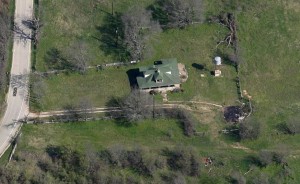 It shows only the back garage as being burned out. From this image the house looks well maintained so one can only wonder what circumstances lead to the structure fire. Continuing on down old Denton road and passing an orchard we stopped at Chapel Cemetery.
It shows only the back garage as being burned out. From this image the house looks well maintained so one can only wonder what circumstances lead to the structure fire. Continuing on down old Denton road and passing an orchard we stopped at Chapel Cemetery.
Chapel Cemetery
Chapel Cemetery was smaller than Elizabeth. It didn’t have the fancy gated entrance or camera setup but was well maintained. The nearby orchard and other industrial activity may have kept vandalism down. Chapel seems to be dominated by a couple of families, Francisco and Raibourn. The Raibourn plots were pretty extensive but right in the middle was this one spelling oddity:
Did Mitchell want to be different? Was he randomly inserted here? Simple coincidence? My money in on the “Lazy Stone Mason” from Elizabethtown who likes to hy-phen words, misunderstanding which Rayburn he needed to use. The last two prominent features here were these odd tree looking gravestones:
They carry a “Woodmen of the Word” seal which I hadn’t noticed before in any of the other cemetery hops I’ve done. A quick Google search turns up that the Woodmen were a fraternal benefit society which has grown into a financial services organization. I would have never known. I’m so glad Al Gore invented the internet.
In all it took us about an hour and half to see the 4 stops on the map and made for a nice mourning morning trip. The full Flickr set can be viewed here: Elizabeth and Chapel Cemetery

